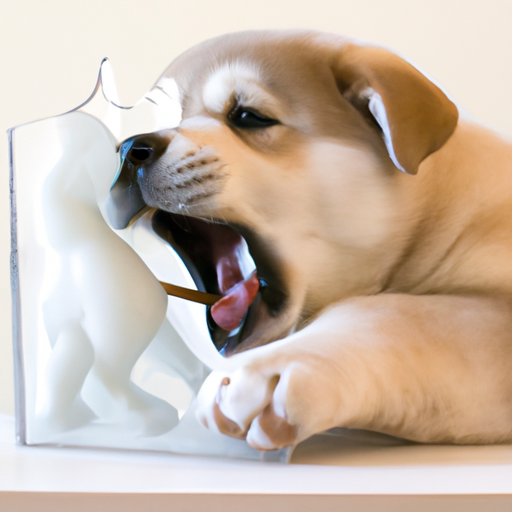Understanding Your Puppy’s Teething Process
As you settle into life with your new furry friend, you may notice small, sharp teeth are causing a bit of trouble – for both you and your puppy! Teething is a natural phase all puppies go through, just like human babies.
Your little one will start teething around 3 weeks old. This is when the first set of baby teeth, also known as deciduous teeth, start to appear. By the time your puppy is about 8 weeks old, they should have a complete set of baby teeth.
The Transition to Adult Teeth
At around 12 weeks, your puppy will start shedding their baby teeth to make way for their adult set. You might find tiny teeth around your house, or you may notice your puppy swallowing them. Don’t be alarmed, this is completely normal.
During this phase, you’ll see:
- Incisors (the small teeth at the front of the mouth) are the first to fall out around 12 to 16 weeks.
- Canines (the long, pointed teeth) start to emerge around 16 weeks.
- Premolars and molars (the larger teeth at the back of the mouth) will appear between 16 and 24 weeks.
Managing Teething Discomfort
Your puppy will likely experience some discomfort during teething. Here are a few ways you can help:
- Provide Chew Toys: There are plenty of puppy-specific chew toys available that can soothe their sore gums.
- Offer Cold Treats: Cold items can provide relief. Try offering chilled carrots or specially designed frozen puppy treats.
- Use Teething Gels: Pet-safe teething gels can numb the gums slightly, providing temporary relief.
Dental Care for Your Dog
Once your dog has a full set of adult teeth, around 7 months old, it’s crucial to maintain good dental hygiene. Here’s a basic guideline:
| Age | Dental Care |
|---|---|
| 7-12 months | Start regular tooth brushing |
| 1-2 years | Consider dental chews and toys |
| 2+ years | Regular dental check-ups with the vet |
FAQs
Q: How many teeth do puppies have?
A: Puppies have 28 baby teeth.
Q: How many teeth do adult dogs have?
A: Adult dogs have 42 teeth.
Q: Is it normal for puppies to swallow their baby teeth?
A: Yes, it’s perfectly normal and doesn’t harm the puppy.
Q: What can I give my puppy for teething pain?
A: Chew toys, cold treats, or pet-safe teething gels can help.
Q: How often should I brush my dog’s teeth?
A: Ideally, you should brush your dog’s teeth daily, but at least a few times a week.
Remember, as a caregiver, your job is to provide comfort and care. Understanding your puppy’s teething process is a step towards ensuring their overall health and wellbeing.



